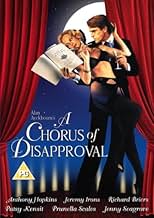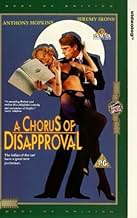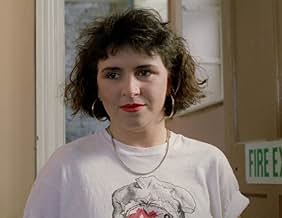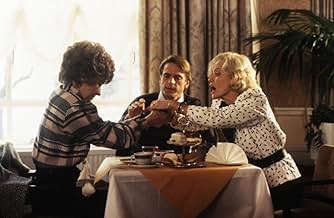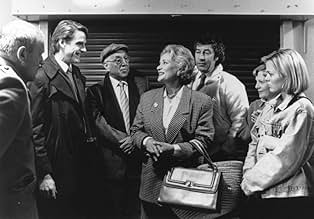Agrega una trama en tu idiomaWidower Guy is transferred to an English coastal town, where he joins an amateur operatic society to "meet people" and "have fun".Widower Guy is transferred to an English coastal town, where he joins an amateur operatic society to "meet people" and "have fun".Widower Guy is transferred to an English coastal town, where he joins an amateur operatic society to "meet people" and "have fun".
- Dirección
- Guionistas
- Elenco
Steve Caswell
- In the audience
- (sin créditos)
Opiniones destacadas
Although this movie has a screenplay by Alan Ayckbourn(AND Michael Winner) it is a sad(and pale) reflection of the stage play. The (hamfisted) direction by Michael Winner has turned what should be witty light comedy,into a slow dreary and turgid drama. It may have the same plot,and basically the same script as the original stage version,but allow Michael Winner to touch it and it becomes boring. What is worse is the misuse and waste of a great cast. I have never (conciously) seen a Michael Winner film before,and going by this never will again. My (newly acquired) DVD is going straight to the charity shop! PS:~ I saw the stage play when it was premiered in 1984.
When I reviewed "The Revengers' Comedies" about ten years ago, I pointed out that the number of feature films based on the work of Sir Alan Ayckbourn could be counted on the fingers of one hand. That remains true today; the four that existed then ("The Revengers' Comedies", "A Chorus of Disapproval" and two by the French director Alain Resnais) have since been joined by a fifth, a Swiss version of "Season's Greetings", but no others. Sir Alan is one of Britain's most successful and prolific playwrights, with more than eighty full-length plays to his credit, most of which have been performed in London's West End and many of which have been adapted for television, but the British film industry has never taken much interest in his work.
When Guy Jones is transferred by his employers, a large electronics firm, to Scarborough, he joins the local amateur operatic society in order to make friends in the town, and becomes involved with their production of "The Beggar's Opera". Guy, a widower, begins an affair with Hannah, the neglected wife of Dafydd Ap Llewellyn, the society's autocratic Welsh stage director. Another plotline concerns a rumour that Guy's employers are considering purchasing a piece of waste ground adjacent to their factory, and several members of the society, hoping to make money from a piece of property speculation, try and obtain inside information from him. One offers him a cash bribe, and Ian Hubbard, a dodgy local businessman, tries to bribe him by offering the sexual favours of his attractive young wife Fay.
The film was directed by Michael Winner, a director whom I would not normally associate with comedy. The only other comedy of his which I have seen was "Parting Shots", a defiantly black and bad-taste, if sometimes effective, social satire, which could have been better but for some eccentric miscasting. One thing that "A Chorus of Disapproval" cannot be criticised for is the casting. The film features some of the leading lights of the British acting profession, including two major international stars in Jeremy Irons as Guy and Anthony Hopkins as Dafydd, and both play their parts perfectly well, as do most of the other cast members.
And yet I have never enjoyed the film as much as I did the original stage play when I saw it in the West End in the mid-eighties. Ayckbourn's success as a dramatist is due not merely to the quality of his plots and dialogue but also on matters which transfer less easily to the cinema screen, such as complexity of structure and his knowledge of stagecraft. (Besides being a playwright, he is also the artistic director of the Stephen Joseph theatre in Scarborough). The screenplay for "A Chorus..." is very much abridged when compared with the original play, although not as much as "The Revengers' Comedies", which was a condensation of two plays into a single film. Winner's rather heavy-handed style of direction is probably more suited to a broad satire like "Parting Shots" than it is to Ayckbourn's more subtle comedy of manners. The original stage production I saw would probably have merited a nine, but something has gone missing between stage and screen. I cannot give the film more than 6/10.
When Guy Jones is transferred by his employers, a large electronics firm, to Scarborough, he joins the local amateur operatic society in order to make friends in the town, and becomes involved with their production of "The Beggar's Opera". Guy, a widower, begins an affair with Hannah, the neglected wife of Dafydd Ap Llewellyn, the society's autocratic Welsh stage director. Another plotline concerns a rumour that Guy's employers are considering purchasing a piece of waste ground adjacent to their factory, and several members of the society, hoping to make money from a piece of property speculation, try and obtain inside information from him. One offers him a cash bribe, and Ian Hubbard, a dodgy local businessman, tries to bribe him by offering the sexual favours of his attractive young wife Fay.
The film was directed by Michael Winner, a director whom I would not normally associate with comedy. The only other comedy of his which I have seen was "Parting Shots", a defiantly black and bad-taste, if sometimes effective, social satire, which could have been better but for some eccentric miscasting. One thing that "A Chorus of Disapproval" cannot be criticised for is the casting. The film features some of the leading lights of the British acting profession, including two major international stars in Jeremy Irons as Guy and Anthony Hopkins as Dafydd, and both play their parts perfectly well, as do most of the other cast members.
And yet I have never enjoyed the film as much as I did the original stage play when I saw it in the West End in the mid-eighties. Ayckbourn's success as a dramatist is due not merely to the quality of his plots and dialogue but also on matters which transfer less easily to the cinema screen, such as complexity of structure and his knowledge of stagecraft. (Besides being a playwright, he is also the artistic director of the Stephen Joseph theatre in Scarborough). The screenplay for "A Chorus..." is very much abridged when compared with the original play, although not as much as "The Revengers' Comedies", which was a condensation of two plays into a single film. Winner's rather heavy-handed style of direction is probably more suited to a broad satire like "Parting Shots" than it is to Ayckbourn's more subtle comedy of manners. The original stage production I saw would probably have merited a nine, but something has gone missing between stage and screen. I cannot give the film more than 6/10.
With all the high-flying "special effects" movies around these days, this movie is a bare-bones, real-life-like story about real people in a small town and the relationships among them. The cast is fantastic. Jeremy Irons should have gotten an Academy Award for his performance. Anthony Hopkins also turns in an admirable character-driven performance that is just one more example of his outstanding acting ability. There were technical aspects of the photography and sound that could be criticized, but, ignoring those, it is a wonderfully portrayed story. Be sure to watch this film with someone who is a feeling person with a good sense of humor and an interest in different people with different personalities. This movie is one of my all time favorites.
Most brilliant about the script is that "The Beggar's Opera" is being staged and as Jeremy Iron's character progresses through the narrative, many of his experiences mimic MacHeath's -- a phenomenon underlined by the score. So, familiarity with the source material makes for a brilliant movie. It might appear very light without that familiarity - also the twisted ending requires some knowledge of another stock theatre piece. Anthony Hopkins, Jeremy Irons and Prunella Scales are utterly thorough - This is the first movie I ever bought, back in the dark pre-internet days when it had to be seriously hunted for. Sound quality is a bit poor and Anthony Hopkins' Welsh accent is a bit thick for those of us who rarely hear one.
10dereal
Saw this, rather incongruously, with Spanish subtitles in a hotel in deepest, darkest Mexico... and made me feel a little homesick with its warm but too-close-to-the-bone portrayal of provincial English life. Lost dreams and opportunities, and eating chips in your car, staring at the gloomy sea and drizzle. Beautiful.
¿Sabías que…?
- TriviaFinal theatrical movie of Lionel Jeffries (Jarvis Huntley-Pike).
- ErroresWhen Guy Jones first arrives in Scarborough and goes to his lodgings in New Steps, off Foreshore Road, he looks out of the window to admire the view of the sea and the bay. This is followed by a shot which is apparently his point of view, but it is from a point about half a mile away near the south end of Cliff Bridge.
- Citas
Dafydd Ap Llewellyn: Ian's just told me. About you and Hannah. You bastard. I just want you to know I think you're a total and utter bastard and that one of these days I hope you'll get what's coming to you.
[pause]
Dafydd Ap Llewellyn: Having said that, best of luck with the show tonight and I hope it goes really well for you.
- Bandas sonorasThe Merry Widow
Music by Franz Lehár
English lyrics by Christopher Hassall
By Arrangement with Glocken Verlag, Ltd.
Selecciones populares
Inicia sesión para calificar y agrega a la lista de videos para obtener recomendaciones personalizadas
- How long is A Chorus of Disapproval?Con tecnología de Alexa
Detalles
- Fecha de lanzamiento
- País de origen
- Idioma
- También se conoce como
- Alles nur Theater
- Locaciones de filmación
- Productoras
- Ver más créditos de la compañía en IMDbPro
Taquilla
- Total en EE. UU. y Canadá
- USD 216,373
- Total a nivel mundial
- USD 216,373
Contribuir a esta página
Sugiere una edición o agrega el contenido que falta


